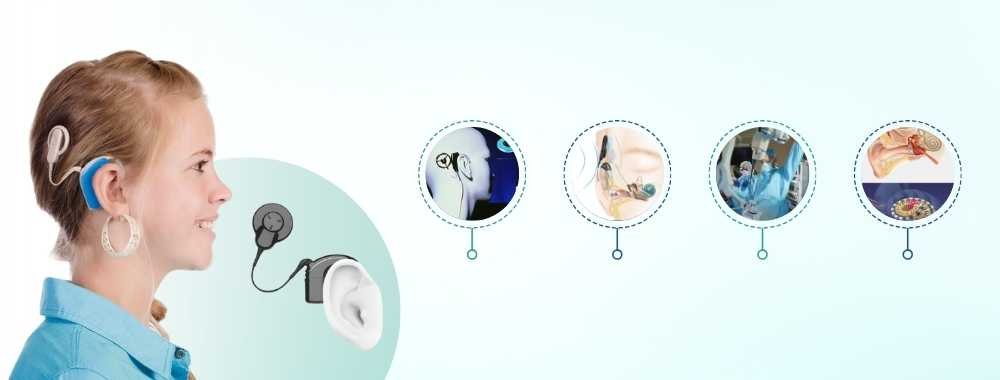Cochlear implant in India isthe right option for international patients due to India's affordable treatment options with quality of care.
Recovery Time
2 Weeks
Success Rate
95-99%
Hospital Stay
1-2 Days
Treatment Type
Surgical
Home Treatments ENT Cochlear Implant
Are you looking for an affordable option to treat hearing loss?
Cochlear implant surgery in India is available at a fraction of the cost, much lower than in many Western countries.
India has highly skilled ENT specialists and state-of-the-art facilities, ensuring top-quality care.
India offers world-class cochlear implant procedures at an affordable price so that patients can restore their hearing without spending too much.

Minimum Cost | Maximum Cost | Hospital Stay | India Stay |
14000 USD | 16500 USD | 2 days | 20 days |
It's a small, complex electronic device that helps to provide a sense of sound to a person who is profoundly deaf or severely hard-of-hearing. However, the device has an external portion that sits behind the ear and a second portion that is surgically placed under the skin.
Here is the list of cochlear parts:
However, an implant does not restore normal hearing, but it gives a deaf person a useful representation of sounds in the environment and helps them to understand speech.

Here is the list of factors that affect the overall cost:
• Type of Implant and Surgical Approach: The cost of a cochlear implant depends on the brand, type, and model of the implant. The surgical technique also affects the cost. Minimally invasive surgeries or complex procedures that require specialised equipment and expertise tend to be more expensive.
• Surgeon's Fees: ENT specialists with more experience usually charge higher consultation and surgery fees, which increases the overall cost of the procedure.
• Patient’s Condition: If the patient’s condition is complex, it may require a longer hospital stay, which can increase the overall cost of the cochlear implantation.
• Type of Hospital: Hospitals accredited by JCI or NABH follow higher standards of care, which can lead to higher surgical costs due to their quality of services.
• Hospitalization Costs: The length of your hospital stay also affects the total cost. The type of room you choose, such as private, deluxe, or shared, can also influence the overall expense.
Cochlear Implant cost
Treatment Name
Estimated Cost
Cochlear Implant 14000-16000 USD
The cost of a cochlear implant depends on several factors such as the doctor's charges, hospital fees, the type of hospital, and much more. Here is the information about the cost breakdown:
Cost Component | Details | Cost |
Pre-operative Consultation & Diagnosis | Consultations, X-rays, MRI scans, blood tests | INR 24900-33200 |
Surgery Costs | Includes surgeon fees, type of surgery, type of implant, and hospital stay | 14000-16000 USD |
Rehabilitation and Follow-up | Physiotherapy sessions, medications, supportive devices, and follow-up visits | Variable by Procedure |
Fill in your details and we'll get back to you soonGet Free Treatment Quote
India | 14000-16000 USD |
United States | 30000-100000 USD |
Germany | 19317-43580 USD |
Turkey | 19317-31000 USD |
Key Takeaways
✅ Affordable Treatment Cost
The cost of cochlear implants in India is significantly lower than in Western countries, allowing you to save up to 40% to 50% on the overall expense. However, the final cost depends on several factors, including the location of the hospital, the hospital's reputation, and the specialist’s experience.
✅ Advanced Medical Technologies
Indian hospitals are equipped with state-of-the-art technology and modern infrastructure, offering high-quality care for patients seeking treatment.
The average cost of a cochlear implant in India is 14000-16000 USD, however, the cost depends on various factors like type of surgery, hospital or doctor, location, medical condition, etc. The best part is, India is the most preferred destination for international patients seeking affordable cochlear implant surgery.
India offers excellent quality care for patients seeking cochlear implants, thanks to advanced technology and highly skilled specialists. Here are the key factors contributing to the quality of care in India:
India’s ENT specialists are highly experienced and internationally trained, ensuring precise and successful cochlear implant procedures.
Hospitals in India are equipped with state-of-the-art technology and have modern infrastructure to provide high-quality care for patients.
Indian hospitals offer personalised and comprehensive care, from diagnosis to post-surgery rehabilitation, ensuring that patients receive the best possible treatment.
• Conductive Hearing Loss
Hearing loss can happen when something blocks the outer or middle part of the ear. For people dealing with this kind of hearing loss, hearing aids can be helpful. They are designed to make sounds louder so that they can get past the blockage and improve hearing.
• Sensorineural Hearing Loss in both ears
This condition is also referred to as nerve deafness, which is caused when there is damage to the inner ear or the Cochlea, or the nerve from the ear to the brain.
• Sensorineural Hearing Loss in one ear
It is also known as single-sided deafness, which is a profound hearing loss in one ear; however, it's a quite common condition.
Cochlear implant surgery is considered a safe procedure that involves placing internal components of the implant under the skin behind the ear and attaching the electrode array inside the cochlea. However, it's a surgical procedure, and like any other procedure, there are some risks as well, but most patients experience a smooth recovery.
The cochlear implant helps patients with these conditions, such as:
Surgery is performed when a person’s hearing is severely affected due to illness or injury. This procedure helps provide hearing assistance to individuals who have lost their ability to hear.
A cochlear implant improves hearing for people with severe hearing loss when medications or other treatments are no longer effective.
Beds: 539
New Delhi
Beds: 230
New Delhi
Beds: 710
New Delhi
Beds: 650
New Delhi
Beds: 191
New Delhi
Beds: 310
New Delhi
Beds: 299
Gurugram
Beds: 380
New Delhi
Beds: 402
New Delhi
Beds: 1300+
Gurugram
Beds: 1000
New Delhi
Beds: 450
Faridabad
Beds: 675
New Delhi
Beds: 500
New Delhi
Beds: 400+
Faridabad

Max Super Speciality Hospital, Saket

Aakash Healthcare Super Speciality Hospital

Indraprastha Apollo Hospital

BLK Max Super Speciality Hospital

Dharamshila Narayana Superspeciality Hospital

Fortis Escorts Heart Institute

Fortis Memorial Research Institute

Manipal Hospital Dwarka

Max Super Speciality Hospital Shalimar Bagh

Medanta - The Medicity Hospital

Moolchand Kharaiti Ram Hospital

Sarvodaya Hospital

Sir Ganga Ram Hospital

Venkateshwar Hospital

Metro Heart Institute with Multispecialty
These hospitals are highly advanced and equipped with state-of-the-art technologies to provide quality care to patients seeking cochlear implant procedures in India.
The best ENT surgeons in India are highly experienced with over 20 years of expertise. Many of them are internationally trained and published in various journals.
Here is the list of the tests that will be done to determine the ear condition:
Tests | Description |
Hearing Tests | An audiologist will conduct tests to assess the extent of your hearing loss, including your ability to hear sounds and understand speech without hearing aids. |
Vestibular Test Battery | This test helps determine the health of your inner ear, which is important for balance. |
Imaging Tests | Imaging tests, such as CT or MRI scans, help to evaluate the structure of your inner ear. |
Dos Before Cochlear Implant Surgery:
Don’ts Before Cochlear Implant Surgery:
Before the procedure
Before getting ready for surgery, you undergo some tests that will help the doctor to understand your condition, and they will decide which implant type is best for you.
During the Procedure
The doctor will give general anesthesia to put the patient in a sleep-like state.
The surgeon will make a small incision behind the ear.
A small hole will be created in the skull.
The internal device will be placed on the skull.
The surgeon will make a small opening in the cochlea.
The electrode of the internal device will be threaded into the cochlea.
After the device is attached, the surgeon will stitch the incision.
After the Procedure
After surgery, you might experience pressure or discomfort over the ear that has the device, and also experience dizziness or nausea.
However, most patients can go home the same day after surgery. You’ll need someone to drive you home if you’re an adult.

Here is the list of technologies that are used in India in cochlear implants, including:
This device helps individuals with severe or profound deafness regain useful hearing by bypassing the damaged inner ear and directly stimulating the auditory nerves with electrical signals.
Designed for those with severe to profound high-frequency hearing loss and intact or moderately affected low-frequency hearing. It addresses age-related and noise-induced hearing loss, which commonly affects high frequencies.
Some Indian hospitals use robotic-assisted surgical systems for cochlear implant surgeries. This technology enhances surgical accuracy and reduces the risk of complications.
Used during surgery to monitor the implant’s functionality in real-time, ensuring correct placement and optimal performance of the device.
Yes, you can engage in sports and physical activities because new modern technologies are designed to be durable and secure, which helps people to participate in various activities. However, you need to follow the guidelines for using the implants properly.
These implants are designed to be long-lasting, and they help to provide hearing benefits for many years. However, the lifespan of a cochlear implant depends, but it’s not uncommon for them to last 10 years or more.
Cochlear implants can help to provide significant improvement in hearing for people with severe to profound hearing loss who don’t benefit from hearing aids.
It helps to improve a person’s ability to communicate and understand speech, which helps to increase their independence in various settings like work, school, and social situations.
These implants are designed to last a long time, and the surgery typically provides permanent improvement in hearing.
Cochlear implants are programmed to meet the unique needs of each patient, which ensures that they get optimal hearing benefits.
Yes, a deaf person can hear sounds with a cochlear implant, but it’s different from how people with normal hearing perceive sound. The implant works by helping the brain receive sound signals in a new way, bypassing damaged areas of the ear and sending signals directly to the auditory nerve. Although the experience of hearing might not be the same as what others hear, the implant can provide a valuable way for someone to connect with sound.

Like any other surgical procedure, cochlear implant surgery also has certain risks and potential complications, which include:
However, there are other potential complications after surgery, which include:
After cochlear implant surgery, most patients can go home the same day, but in rare cases, some may need to stay overnight. The length of your stay depends on the timing of the surgery and how you're feeling afterwards. During your initial recovery period, you might experience the following:
Cochlear implants have a high success rate of 95% to 98%, with a very low failure rate of around 0.5%, which may require reimplantation.
• Team of Top ENT Surgeons
Mejocare recommends that doctors have more than 20 years of experience in procedures, including cochlear implants, balloon sinuplasty, and so on.
• JCI/NABH Accredited Hospitals
We have partnered with hospitals that have State-of-the-art Facilities that are equipped with the latest technologies, such as robotics, machine learning, and cutting-edge diagnostic and therapeutic equipment, designed to offer you comprehensive and personalised care.
• Other Benefits
We offer a variety of services, including medical visa invitation letters and guidance through visa procedures and formalities. From airport pickups and drop-offs to hotel bookings and 24/7 patient support, they ensure a seamless experience for international patients.
Additionally, provides hospitalisation assistance, local SIM cards, and fit-to-fly certificates for patients ready to travel after treatment.
The cochlear implant procedure helps with hearing loss, where a team of experts performs the surgery. Still, it has complications as well, such as infection, nerve harm, dizziness, bleeding disease, etc, so before surgery, patients undergo several tests. Then, doctors decide whether the surgery should be performed or not.
Disclaimer
The information we have mentioned in this article is for general purposes, and it does not intend to provide an accurate cost estimate or other details. So, if you’re seeking professional opinions and have an accurate cost estimate, then connect with Mejocare now.

Medically Reviewed By
QualificationsMBBS, DTMU University, Georgia,Radiation Oncology Resident at Burdwan Medical College and HospitalDr. Aryan Malhotra is a skilled and caring doctor. He is a Radiation Oncology Resident at Burdwan Medical College and Hospital. He treats people with cancer and works closely with patients during their treatment.He completed his MBBS from David Tvildiani Medical University in Georgia. He has passed the USMLE... Read More
The cost of a Cochlear Implant Surgery in India ranges between 14000-16000 USD.
The success rate of Cochlear Implant Surgery in India is around 95-99%.
You normally have to stay in the hospital for 3 days.
It might take 1-2 weeks to recover at first. But getting used to hearing sounds takes longer. You should wear the speech device all day while you're awake. This helps your brain learn and understand the new sounds.
Complications from Cochlear Implants are uncommon, but they can occur. You might experience rare risks such as bleeding, facial paralysis, or infections at the surgery site or in the device. There's a possibility of balance issues, dizziness, or taste disturbances, as well as new or intensified ear noise (tinnitus) and even spinal fluid leaks. These risks, though infrequent, are important to be aware of when considering a Cochlear Implant.
Therapy focuses on teaching your brain to understand the new sounds from the implant. This involves getting used to speech and everyday noises, which may sound different. The key is consistent use of the speech processor during waking hours to adapt to these changes.
Yes, it is necessary to have a companion.
Patients who've undergone uncomplicated cochlear implant surgery typically can consider air travel within one to two weeks post-procedure. However, it's advisable to confirm this timeline directly with your surgeon for personalized guidance.
Yes, you can do your own research and choose your therapist.
Paracetamol is a suitable option for regular use. Additionally, non-steroidal anti-inflammatory drugs (NSAIDs) like diclofenac or ibuprofen can effectively control moderate pain.
Yes, insurance will cover the cost of Cochlear Implant Surgery in India.
To discover the top doctors or hospitals in India, you can visit our website, mejocare on the doctors' page, you can filter and find the finest doctors, while on the hospital page, you can identify the best hospitals. Additionally, you can reach out to us, and we will gladly offer you all the necessary suggestions and information you need.
While a local anesthetic can be an option, Cochlear Implant Surgery is commonly carried out under general anesthesia. Generally, the procedure lasts around two hours.
No, there is no waiting list for Cochlear Implant Surgery in India.
Usually, a CT scan is done to assess if the procedure is safe and optimal for you.
General Anaesthesia is used during Cochlear Implant.
The healing process typically takes around 3 to 6 weeks before the doctor activates the implant. However, most individuals can usually return to work within 1 to 2 weeks post-surgery. During this time, the scar from the incision will gradually diminish as your body heals.
After surgery, stick to soft, bland foods like soups, yogurt, mashed potatoes, and scrambled eggs for a few days. Avoid nuts, grains, seeds, acidic foods (like orange juice and tomato sauce), and spicy dishes to support your recovery.
The hospital provides comprehensive aftercare services, including monitoring vital signs, administering wound care, managing any post-operative complications, offering rehabilitation services, and scheduling follow-up appointments.
Our care team can help you.
